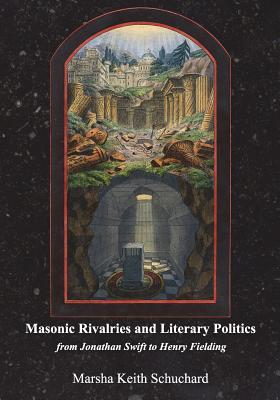
Book
Masonic Rivalries and Literary Politics: From Jonathan Swift to Henry Fielding
(Write a Review)
Paperback
$30.00
Introduction
Chapter 1 - The Ruined Temple and the Flight of Knights (1685-1691)
Chapter 2 - Freemasons, Rosicrucians, and Radical Clubs (1691-1703)
Chapter 3 - Jacobites, Williamites, and Disputed Architectural Traditions (1695-1703)
Chapter 4 - Judaized Scots, Jacobite Jews, and the Problem of "False Brothers" (1702-1712)
Chapter 5 - Building Castles in the Air, at Home and Abroad (1710-1716)
Chapter 6 - The Swedish-Jacobite Plot and the Grand Lodge of London (1716-1719)
Chapter 7 - Scottish-Swedish Masonic Traditions and English Innovations (1719-1722)
Chapter 8 - Atterbury, Wharton, and "Combinations of Workmen" (1722-1723)
Chapter 9 - Chinese and Cabalistic Threats to the Grand Lodge (1723-1724)
Chapter 10 - Masonic Rivalries and International Ramifications (1725-1726)
Chapter 11 - A New King, Yet Old Corruption (1727-1730)
Chapter 12 - International Expansion of Chivalric Masonry (1730-1732)
Chapter 13 - Masonic Politics and "A Babel of Religions" (1732-1733)
Chapter 14 - Outbreaks of "Hyp" at Home and Abroad (1734)
Chapter 15 - Riots in Britain, Wars in Europe, Charges of Masonic Conspiracy (1735-1736)
Chapter 16 - Rival Claimants to the "Higher Order" and "Ancient Footing" (1737)
Chapter 17 - Two Young Pretenders to the British Throne (1738-1739)
Chapter 18 - Masonic Cabalists and the Opposition Cabal (1740-1742)
Chapter 19 - Mock Masons, Royal Arch Rebels, and Invasion Fears (1743-1744)
Chapter 20 - Rebuilding the Temple in the North (1745)
Chapter 21 - Early Jacobite Victories, Apparent Hanoverian Triumph (1745-1746)
Chapter 22 - Rival Grand Masters, Beheadings, and Boastings (1746-1748)
Chapter 23 - Disappearance of One Young Pretender, Emergence of the Other (1748-1750)
Epilogue - Schisms: Antients versus Moderns, Royalists versus Republicans, Nationalists versusImperialists (1751-1788)
Abbreviations
Bibliography
Index
Introduction
Chapter 1 - The Ruined Temple and the Flight of Knights (1685-1691)
Chapter 2 - Freemasons, Rosicrucians, and Radical Clubs (1691-1703)
Chapter 3 - Jacobites, Williamites, and Disputed Architectural Traditions (1695-1703)
Chapter 4 - Judaized Scots, Jacobite Jews, and the Problem of "False Brothers" (1702-1712)
Chapter 5 - Building Castles in the Air, at Home and Abroad (1710-1716)
Chapter 6 - The Swedish-Jacobite Plot and the Grand Lodge of London (1716-1719)
Chapter 7 - Scottish-Swedish Masonic Traditions and English Innovations (1719-1722)
Chapter 8 - Atterbury, Wharton, and "Combinations of Workmen" (1722-1723)
Chapter 9 - Chinese and Cabalistic Threats to the Grand Lodge (1723-1724)
Chapter 10 - Masonic Rivalries and International Ramifications (1725-1726)
Chapter 11 - A New King, Yet Old Corruption (1727-1730)
Chapter 12 - International Expansion of Chivalric Masonry (1730-1732)
Chapter 13 - Masonic Politics and "A Babel of Religions" (1732-1733)
Chapter 14 - Outbreaks of "Hyp" at Home and Abroad (1734)
Chapter 15 - Riots in Britain, Wars in Europe, Charges of Masonic Conspiracy (1735-1736)
Chapter 16 - Rival Claimants to the "Higher Order" and "Ancient Footing" (1737)
Chapter 17 - Two Young Pretenders to the British Throne (1738-1739)
Chapter 18 - Masonic Cabalists and the Opposition Cabal (1740-1742)
Chapter 19 - Mock Masons, Royal Arch Rebels, and Invasion Fears (1743-1744)
Chapter 20 - Rebuilding the Temple in the North (1745)
Chapter 21 - Early Jacobite Victories, Apparent Hanoverian Triumph (1745-1746)
Chapter 22 - Rival Grand Masters, Beheadings, and Boastings (1746-1748)
Chapter 23 - Disappearance of One Young Pretender, Emergence of the Other (1748-1750)
Epilogue - Schisms: Antients versus Moderns, Royalists versus Republicans, Nationalists versusImperialists (1751-1788)
Abbreviations
Bibliography
Index
Paperback
$30.00